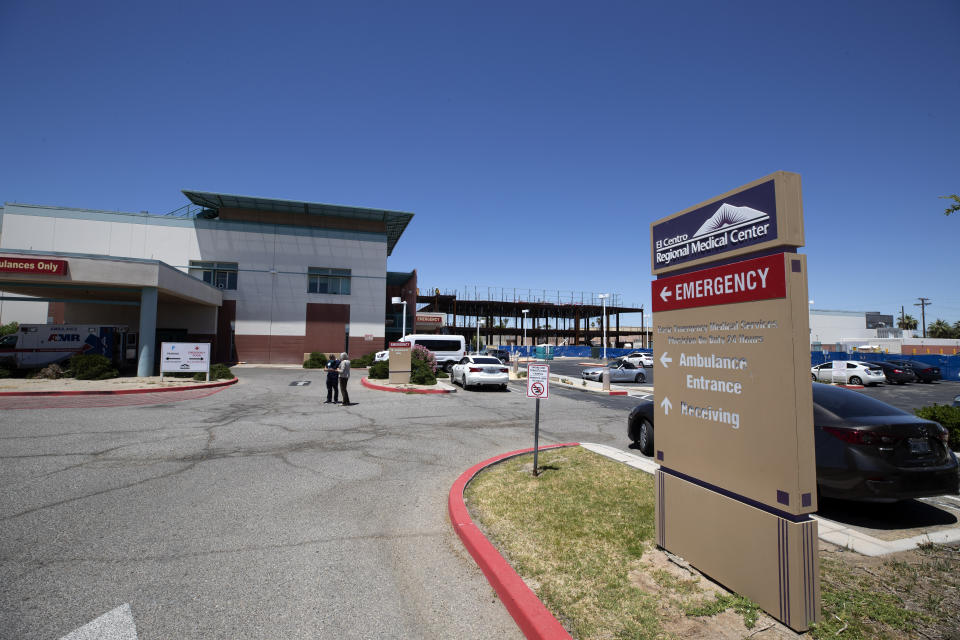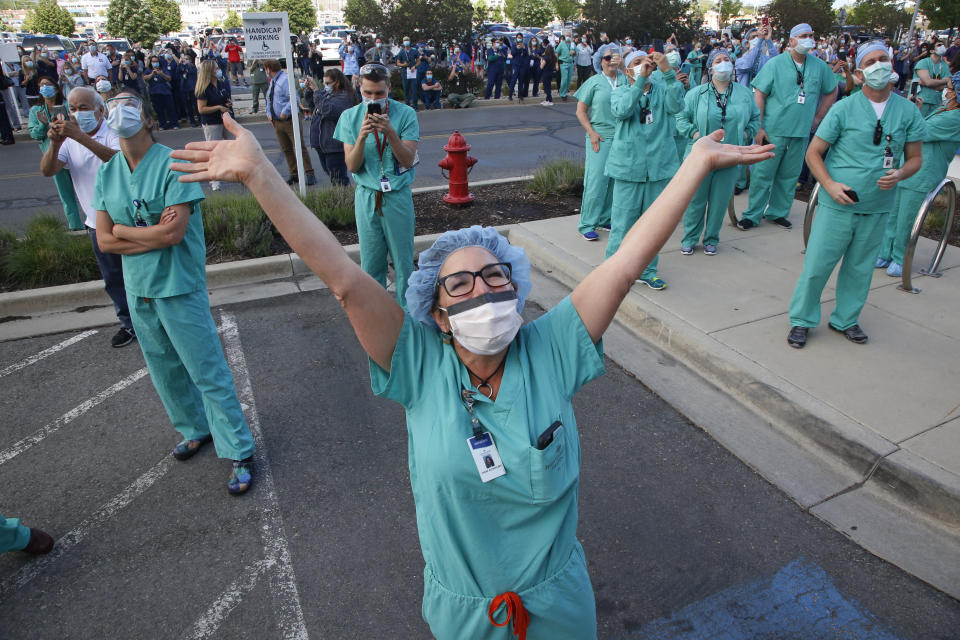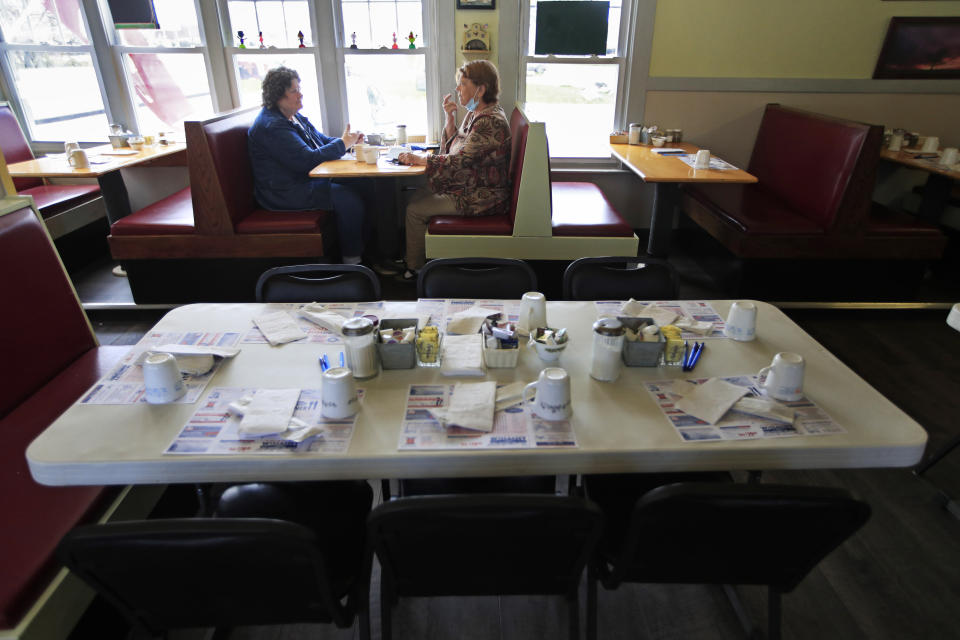What you need to know today about the virus outbreak
Pandemic politics shadowed President Donald Trump’s trip to Michigan to highlight lifesaving medical devices, with the president and officials from the electoral battleground state clashing over federal aid, mail-in ballots and face masks.
The president did not wear a face covering Thursday despite a warning from the state’s top law enforcement officer that a refusal to do so might lead to a ban on Trump's return.
Trump visited Ypsilanti, outside Detroit, to tour a Ford Motor Co. factory that had been repurposed to manufacture ventilators, the medical breathing machines governors begged for during the height of the COVID-19 pandemic.
The visit came as the number of Americans applying for unemployment benefits in the two months since the coronavirus took hold in the U.S. hit nearly 39 million even as states gradually let people go back to work after nationwide business shutdowns triggered by the outbreak. The Labor Department says more than 2.4 million people filed for jobless aid last week alone.
The continuing trend of heavy job cuts reflects an economy that is sinking into the worst recession since the Great Depression. The National Association of Realtors reports that sales of existing homes plunged 17.8% in April, the largest one-month decline since a 22.5% fall in July 2010.
Here are some of AP’s top stories Thursday on the world’s coronavirus pandemic. Follow APNews.com/VirusOutbreak for updates through the day and APNews.com/UnderstandingtheOutbreak for stories explaining some of its complexities.
WHAT’S HAPPENING TODAY:
— Many U.S. colleges are looking to reopen this fall, with dramatic changes like scrapping big lectures, limiting the capacity of dorms and requiring mandatory testing for the coronavirus. At some smaller schools, students may be barred from leaving campus.
— A church in Mississippi has been destroyed by a suspected arson fire about a month after its pastor filed a lawsuit challenging restrictions because of the coronavirus. Investigators at the scene of the First Pentecostal Church in Holly Springs, Mississippi, found graffiti at the scene that read “bet you stay home now you hypokrites.”
— Russian medical workers say they face mistrust, low pay and even hostility as they battle both the coronavirus and a system that fails to support them. Doctors who try to speak out about a lack of protective equipment and dire working conditions are accused of lying, and some are being fired or face prosecution.
— As much of California reopens businesses amid easing coronavirus restrictions, a farming region bordering Mexico is struggling with a spike in cases. A spokesman for the largest hospital in the Imperial Valley area east of San Diego believes American citizens living in the Mexicali, Mexico, are crossing the border to the U.S. for treatment.
— Fast-food restaurants have fared better than sit-down restaurants as the coronavirus pandemic gripped the U.S., but that gap appears to be closing with the opening of dining rooms, especially chain eateries.
___
WHAT YOU NEED TO KNOW:
For most people, the coronavirus causes mild or moderate symptoms, such as fever and cough that clear up in two to three weeks. For some, especially older adults and people with existing health problems, it can cause more severe illness, including pneumonia and death. The vast majority of people recover.
Here are the symptoms of the virus compared with the common flu.
One of the best ways to prevent spread of the virus is washing your hands with soap and water. The U.S. Centers for Disease Control and Prevention recommends first washing with warm or cold water and then lathering soap for 20 seconds to get it on the backs of hands, between fingers and under fingernails before rinsing off.
You should wash your phone, too. Here’s how.
TRACKING THE VIRUS: Drill down and zoom in at the individual county level, and you can access numbers that will show you the situation where you are, and where loved ones or people you’re worried about live.
___
ONE NUMBER:
— 300,000: Growing numbers of health professionals around the world are filling an important role in the effort to guard against a resurgence of the coronavirus. They're known as contact tracers. Some estimate as many as 300,000 of them would be needed in the U.S. to adequately curtail the spread. While some states like Utah have reported having enough contact tracers, others are short hundreds or even thousands of people.
IN OTHER NEWS:
— FEEDING THE MASSES: A golden-domed Sikh temple for centuries has been the symbol of equality in India's capital city. It's serving free meals to millions of people and playing an important role despite the country's coronavirus lockdown banning religious congregations. The Bangla Sahib Gurdwara's kitchen is cooking up to 100,000 meals a day that the New Delhi government distributes at shelters and drop-off points throughout the city.
— SISTERS REUNITED: A New Zealand woman is reunited with her dying sister in Australia after gaining an exemption from pandemic travel restrictions on compassionate grounds. The country had turned down her request to fly on four previous occasions. Christine Archer’s only sister, Gail Baker, was diagnosed with incurable ovarian cancer in late March after both countries stopped international travel.
___
Follow AP coverage of the virus outbreak at https://apnews.com/VirusOutbreak and https://apnews.com/UnderstandingtheOutbreak












